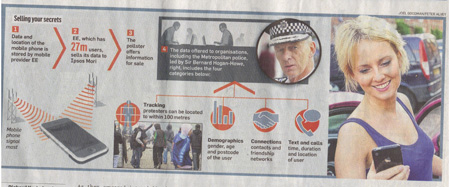I am spending too much time on @spyblog Twitter and not enough on this blog.
With Twitter, you can do very little with 140 characters (some of Spy Blog's blog post titles are that long !) but when a media article contains so many errors, one wonders if this is because of ignorance or if it is deliberate disinformation.
via @CasparBowden:
The supposedly right of centre magazine The Spectator has a tiny print readership (under 50,000 a week) compared to many blogs, but it has a venerable history and so is an influential part of the UK commentariat.
This article by @RobinSimcox Robin Simcox from the oddly named, for a controversial British think tank, Henry Jackson Society, is annoyingly wrong:
What are we willing to do to make our intelligence agencies' job easier ?
Robin Simcox 19 February 2015 16:45Ottawa. Sydney. Paris. Copenhagen. Four major Western cities attacked in five months by Islamist terrorists and all committed by perpetrators with lengthy histories of criminal activity.
When the next terrorist attack occurs, there will be those that demand to know why intelligence agencies failed to watch the perpetrators closely enough (as was the case with the murder of Drummer Lee Rigby).
So what ? The securocrats and the Intelligence and Security Committee always either ignore these critics , or absolve the agencies of any blame retrospectively regardless.
There has never been any discplinary action against, or prosecution of, inept securocats.
However, should we not also ask what we, as a society, are willing to do to make our intelligence agencies' job easier?
There are several things which would make the job of our intelligence agencies easier:
- Stop demanding that they protect us all, 100% of the time - they do not have magical abilities. They need and cannot be trusted with, 100% surveillance powers
- Stop pretending that mass surveillance trawling of millions of innocent people's data, rather than narrowly focussed targeted investigations, somehow detects, let alone prevents, real terrorist attacks or serious crimes.
- Stop wasting intelligence agency resources on trying to stop "lone wolves". Let the police rapid response teams deal with mad dog / lone wolf small scale terrorist attacks, but without creating huge collateral economic damage, by disrupting a whole city because of a single gunman, trapped in a siege, as happened in Sydney.
- Put some real money and resources in to prisons to counter the radicalisation which turns petty criminal losers into suicidal murderers.
- Stop converting mentally unstable religious extremists into actual terrorists by inept attempts to recruit them as informers on their family members, friends and associates.
- Stop pretending that Terrorism Act 2000 s.58 Collection of information prosecutions for "thought crimes" under the are somehow effectively "disrupting" wannabe terrorists, who have no access to money or weapons
- Simplify and repeal the horrendously complicated Terrorism and RIPA / DRIPA legislation
- Repeal all thee terrorism and national security criminal offence legislation which pretends to have a global scope. When the Serious Crime Bill "national security of any country" amendments to the Computer Misuse Act become law, the Police and Intelligence Services will be forced to waste resources to investigate Distributed denial of Service attacks by Americans against North Korea or by Russians against Ukraine, with no hope of a prosecution.
- Stop wasting resources on people planning to go to Syria or Afghanistan etc. to fight and die, or to be wounded or raped or robbed - concentrate on the survivors, if they ever come back to the UK.
- Stop sharing Top Secret STRAP1 and STRAP2 documents with hundreds of thousands of United States people holding generic security clearances. Prosecute the UK securocrats under the Official Secrets Act 1989 s8 Safeguarding of information, who allowed such information to fall into the hands of whistleblower Edward Snowden and who know how many current or future Geoffrey Prime style Russian or Chinese etc. spies.
Consider the current debate surrounding communications data (the who, when, where, and how of a communication, but not the what - i.e. the content). Access to communications data is not so different to other long-standing forms of state interception. Imagine communications data being the equivalent to the interception of an envelope showing an address and a postmark containing a date and geographic location. The content data would be the actual letter inside the envelope.
No !
This paragraph espouses the sort of simplistic Home Office spin about Communications Data when they introduced the Regulation of Investigatory Power Act 2000 15 years ago i.e. before
- The massive rise in the use of Mobile Phones etc. and Cell Site Location Data
- USA based social media websites like FaceBook and Twitter even existed
In many cases, Communications Data is more "useful" and therefore more intrusive than the content of communications (which can entirely mundane, or obscured by jargon or pre-arranged codewords or rare foreign language dialects), especially that involving real time Location Tracking or when the "friendship tree" of a mobile phone or email account is traced automatically.
According to Home Secretary Teresa May, communications data 'played a significant role in every Security Service counter-terrorism operation over the last decade' and was 'used as evidence in 95 per cent of all serious organised crime cases handled by the Crown Prosecution Service'. It is also vital in preventing child abuse and exploitation; identifying and locating suicide risks; identifying rapists, kidnappers or threatening callers; and murder investigations. A Secretary of State signed warrant is required in order to access the data
This is a major factual error.
Any Secretary of State, usually the Home Secretary or the Foriegn Secretary (but also by their Officials) or only deal with Regulation of Investigatory Powers Act 2000 IPA Part 1 Interception warrants and Intelligence Services Act 1994 s5 overseas "licence to kill" warrants .
There are no Communications Data Warrants
.
Access to Communications Data is self authorised by the Police and Intelligence Agencies, and by the hundreds of other public bodies. Unlike other countries there is no independent judicial warrant system, only a medium ranking officials e.g. a Police Superindent or, even an Inspector (one rank above Sergeant) authorises access to Communications Data demands. Supposedly there is a "Chinese wall" between an investigatory team and their collegue who authorises the demand, but clearly this is open to abuse and to institutional groupthink.
and oversight is provided by independent commissioners (the extent to which this is oversight is sufficient is one of the subjects I explore in a soon-to-be-released Henry Jackson Society report on the impact that the Snowden disclosures have had on UK and US security).
The RIPA Commisioners are former Judges, without any power except to write Annual Reports, which are, with one execption (the latest report by the Interception of Communications Commissioner) , never made fully public. They are heavily restrained by the legislation and by a lack of resources and do not see their role to deal directly with the public at all.
The Interception of Communications Commissioner @iocco_oversight only looks at up to 10% of Communications Data requests / demands, but only as an audit after the fact.
The Intelligence Services Commisioner does not, so far as anyone can tell, do even this amount of scrutiny.
Just because grabbing Communications Data is part of the Standard Operating Procedure for Police investigations these days (as common as brewing cups of tea), does not mean that it actually contributes very much, in most cases.
The Home Office cannot, or does not dare to, provide any statistics for the number of serious crime or terrorism cases where Communications Data actually:
- Provided the initial investigative breakthrough in a case
- Was the crucial evidence leading to a conviction
With over 250,000 Communications Data requests a year, one would have expected there to be hundreds if not thousands of such examples ready to hand. Instead they cite a few headline grabbing cases, which, upon closer examination, did not actually rely on Communications Data, especially 12 months Retained Communications Data, at all.
To maximise its usefulness, communications data needs to be collected in bulk,
Nonsense ! To maximise its usefulness, Communications Data needs to be carefully targeted.
yet our intelligence agencies' access to it is declining. There are specific reasons for this. Previously, telephone communications and internet traffic traditionally took place via a fixed landline. Communications data - who was called, for what duration and the geographic location - was needed for billing reasons. Yet increasing amounts of people pay a fixed price monthly direct debit to their provider, making this data increasingly irrelevant to communication service providers (CSPs). As a result, CSPs have less need to generate - let alone retain - communications data. Furthermore, communications now increasingly take place via mobile networks and broadband. This has been accompanied by a growth in alternative communications methods: video messaging, instant messaging, Skype and social network platforms.The government tried to address these challenges with the Communications Data bill in 2012
and was subsequently accused of trying to draw up a 'Snooper's Charter', not least by the Deputy Prime Minister Nick Clegg. The Parliamentary Joint Committee on the Draft Communications Data Bill concluded that the Bill paid 'insufficient attention to the duty to respect the right to privacy, and goes much further than it need or should for the purpose of providing necessary and justifiable official access to communications data'.
c.f. Report and evidence for the Draft Communications Data Bill
The Intelligence and Security Committee also encouraged more work to be done.
Even the securocrat biased Intelligence and Security Committee report, with a more limited, self imposed remit, was critical of this Draft Communications Data Bill.
Access to communications data by the intelligence and security Agencies (.pdf)
The bill was shelved and the issue temporarily kicked back into the long grass.Yet the urgent need to fix the issues that gave rise to the first Communications Data bill meant that inevitably the issue has been raised again, most recently by the Prime Minister and Home Secretary. The 'Snooper's Charter' accusations have already resurfaced. We saw another glimpse into how this is going to play out in the media when David Cameron recently said that both communications and content data must be viewable if there is a signed warrant from the Home Secretary. Rather than this argument being taken on its merits, he was immediately accused of wanting to ban all encryption technology.
That is not what David Cameron said. Even the Daily Telegraph reported that:
General Election 2015: David Cameron to give more snooping powers to spies
Mr Cameron said any new law would be in force from next year.
He said: "If I am prime minister I will make sure that it is a comprehensive piece of legislation that does not allow terrorists safe space to communicate with each other.
"That is the key principle: do we allow terrorists safer spaces for them to talk to each other. I say no we don't - and we should legislate accordingly. And if I am in Government that is what you will get."
That can only be interpreted as an attack on end to end estrong encryption. Such a stupidpolicy would destroy the UK's internet economy and make us vulnerable to the Four Horsemen of the Infoclypse.
An Interception warrant for content already allows for the associated Communications Data to be demanded, without any extra authorisation. This has been so since the Regulation of Invesigatory Powers Act 2000 came into force.
We demand privacy, the right to decide what data we share and security.
We are not stupid enough to believe that we can have 100% "security", so there is no practical moral or legal case for 100% surveillance, especially of the vast majority of innocent people.
Yet if the government attempts to plug gaps in the law that makes it easier to track or prosecute terrorists, cries of 'police state' erupt. Politicians are often accused of hypocrisy; but on these issues the hypocrisy mainly lies with the rest of us.
Gathering more data on innocent people does not help to prevent terrorism.
The murderers of Drummer Lee Rigby were described as "extremely security aware". One of the Charlie Hebdo murderers had already been convicted on the basis of phone intercept evidence, so was completely aware of it, and subsequent French phone intercepts heard nothing incriminating for years.
My upcoming report makes the clear case that all this needs to change. The debate regarding liberty/security/privacy has become - in part down to Edward Snowden - hopelessly skewed.
There has been some debate in Germany and in USA, but there has not been any significant debate in the United Kingdom.
All we get is the cynical mockery of "everything we do is legal, trust us".
While all citizens should be concerned about freedom and privacy, agencies like GCHQ are allies in this, not enemies. They protect the nation from a host of hostile state and non-state actors and, in fact, have been doing so for decades. Constantly denigrating those that help keep us safe is no way to build a more liberal or more secure nation.
Perhaps that used to be the case during the old Cold War, but now in the internet and mobile phone areas, by attacking the very infrastrucure of electronic communications, for mass surveillance data trawling, rather than narrowly targeted investigations, these agencies are actually perceived as more of a security threat to their own private citizens and companies, than foreign intelligence agencies from Russia or China, or organised criminals like drug cartels, or terrorist groups like Al Quaeda or ISIS.
Until there is a lot more transparency and really effective oversight of UK intelligence agencies, they will not be given the benefit of the doubt, no matter how ethical or effective they claim to be in secret.
Robin Simcox is a Research Fellow at The Henry Jackson Society. His report will be published in March.
Hopefully there will be fewer mistakes and misconceptions in this report, than in this annoying article









































Recent Comments